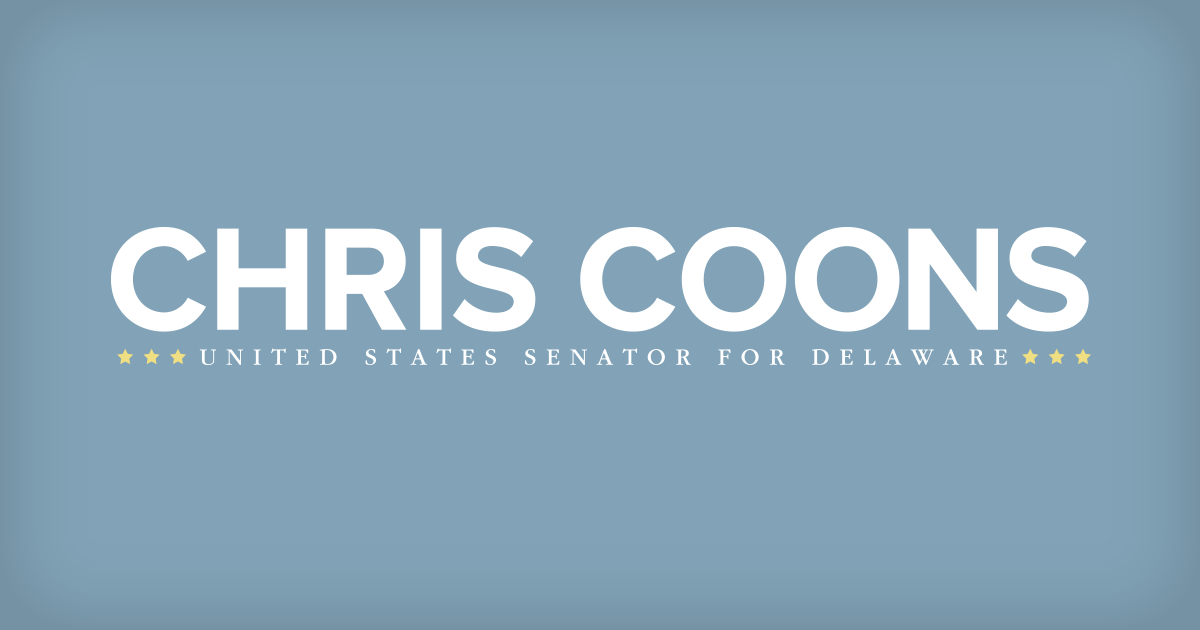Source: United States Senator for Delaware Christopher Coons
WASHINGTON — In a letter to President Biden, U.S. Senator Chris Coons (D-Del.), along with Senator Bill Hagerty (R-Tenn.) and U.S. Representatives Rick Larsen and David Schweikert (R-Ariz.), who co-chair the Asia-Pacific Economic Cooperation (APEC) Caucus in the U.S. House of Representatives, called on the United States to host the APEC meetings in 2023. APEC is a forum of 21 member economies working to accelerate regional integration and free trade in the Pacific rim. President Biden will participate in the APEC Leaders’ Virtual Retreat this Friday.
“We write to ask that you seize the opportunity for the United States to host the APEC meetings in 2023,” the lawmakers requested. “APEC members represent seven of the top 15 markets in the world for U.S. goods exports, and according to estimates from the Department of Commerce, over 6.1 million American jobs are supported by U.S. exports of goods and services to the APEC region.”
The lawmakers concluded, “We must play a leadership role in this forum to ensure that we do not cede ground and allow the economic rules of the road to be written by others who attempt to use APEC to push harmful policies or to weaken our positive agenda on issues like digital trade, data privacy, anti-corruption, state-owned enterprises, and infrastructure.”
The full letter is available here and below.
Dear President Biden:
We write to ask that you seize the opportunity for the United States to host the APEC meetings in 2023. We also encourage you to attend the key Indo-Pacific Leaders’ summits this November, the Asia-Pacific Economic Cooperation (APEC) Leaders’ Meeting, hosted virtually by New Zealand, and the East Asia Summit, hosted by Brunei, and to also ensure that the United States is represented at the appropriate levels at Ministerial and technical meetings throughout the year.
We commend the importance the administration places on continued American leadership on the world stage, including through engagement in multilateral organizations, which are key vehicles for advancing U.S. foreign policy on a range of issues from security to socioeconomic interests to trade. As we work together to compete with the People’s Republic of China from a position of strength, we should use all appropriate bilateral and multilateral tools available, including participation and leadership in and with the members of the APEC forum and the Association of Southeast Asian Nations (ASEAN) (and associated ASEAN-centric institutions including the East Asia Summit), key regional institutions that offer opportunities to maximize our influence across the Indo-Pacific region.
Through APEC, we work with partners in Asia – including Taiwan – and Latin America toward building an interconnected regional economy. Taken together, APEC’s 21 members account for 38% of the world’s population, and in 2019 they generated a collective GDP of $53 trillion, accounting for 61% of global GDP and 47% of world trade. APEC members represent seven of the top 15 markets in the world for U.S. goods exports, and according to estimates from the Department of Commerce, over 6.1 million American jobs are supported by U.S. exports of goods and services to the APEC region. In short, our ability to continue to open markets and build a class of consumers for U.S. products in the Indo-Pacific is inextricably linked to the future economic health of the United States.
As an APEC member, the United States is able to engage regional partners, like Australia, Japan, Singapore, and Taiwan, and to manage strategic competitors – namely, China – on a range of economic policy issues, and work with these partners toward regulatory and policy reforms that are favorable to U.S. firms, workers, and consumers. If we step back, other APEC members who do not share our interests or values are there to fill the void. We must play a leadership role in this forum to ensure that we do not cede ground and allow the economic rules of the road to be written by others who attempt to use APEC to push harmful policies or to weaken our positive agenda on issues like digital trade, data privacy, anti-corruption, state-owned enterprises, and infrastructure. Such efforts may also serve to or to bolster their own domestic agendas and political narratives.
Sincerely,
###
